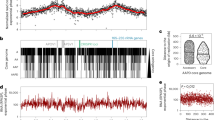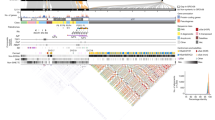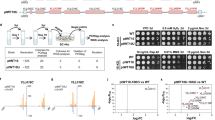Abstract
The nucleotide sequence of the 948,061 base pairs of chromosome XVI has been determined, completing the sequence of the yeast genome. Chromosome XVI was the last yeast chromosome identified1, and some of the genes mapped early to it, such as GAL4, PEP4 and RAD1(ref. 2) have played important roles in the development of yeast biology. The architecture of this final chromosome seems to be typical of the large yeast chromosomes, and shows large duplications with other yeast chromosomes. Chromosome XVI contains 487 potential protein-encoding genes, 17 tRNA genes and two small nuclear RNA genes; 27% of the genes have significant similarities to human gene products, and 48% are new and of unknown biological function. Systematic efforts to explore gene function have begun.
This is a preview of subscription content, access via your institution
Access options
Subscribe to this journal
Receive 51 print issues and online access
$199.00 per year
only $3.90 per issue
Buy this article
- Purchase on Springer Link
- Instant access to full article PDF
Prices may be subject to local taxes which are calculated during checkout
Similar content being viewed by others
Author information
Authors and Affiliations
Consortia
Corresponding author
Rights and permissions
About this article
Cite this article
Bussey, H., Storms, R.K., Ahmed, A. et al. The nucleotide sequence of Saccharomyces cerevisiae chromosome XVI. Nature 387 (Suppl 6632), 103–105 (1997). https://doi.org/10.1038/387s103
Received:
Accepted:
Issue Date:
DOI: https://doi.org/10.1038/387s103
Comments
By submitting a comment you agree to abide by our Terms and Community Guidelines. If you find something abusive or that does not comply with our terms or guidelines please flag it as inappropriate.



